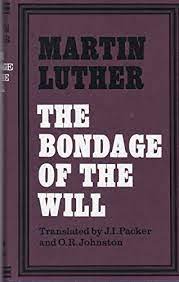
A new translation of De Servo Arbitrio: Martin Luther’s reply to Erasmus of Rotterdam (1525), by J.I. Packer and O.R. Johnston.
The Bondage of the Will is one of the basic documents of the Reformation, and is perhaps Luther’s best known work. Luther himself regarded it as his most important piece of theological writing, one that lay at the heart of the Gospel as he understood it. It was written as a reply to the Diatribe of Erasmus, and addresses a subject that is fundamental to an understanding of all Luther’s teaching – the problem of the Freedom of the Will. Luther affirms man’s total inability to save himself, and the sovereignty of Divine Grace in his salvation. In making this affirmation, he explains and upholds the doctrine of justification by faith, and defends predestination as determined by the foreknowledge of God.
This translation features a new division of Luther’s treatise into eight main parts, and then into further sections according to subject matter. Included is a fifty-page Historical Introduction and an index of biblical references. The translators have provided a text that not only accurately conveys the thought of the original Latin, but also something of the vigour and dialectical skill characteristic of Luther’s style.
The Bondage of the Will is one of the basic documents of the Reformation, and is perhaps Luther’s best known work. Luther himself regarded it as his most important piece of theological writing, one that lay at the heart of the Gospel as he understood it. It was written as a reply to the Diatribe of Erasmus, and addresses a subject that is fundamental to an understanding of all Luther’s teaching – the problem of the Freedom of the Will. Luther affirms man’s total inability to save himself, and the sovereignty of Divine Grace in his salvation. In making this affirmation, he explains and upholds the doctrine of justification by faith, and defends predestination as determined by the foreknowledge of God.
This translation features a new division of Luther’s treatise into eight main parts, and then into further sections according to subject matter. Included is a fifty-page Historical Introduction and an index of biblical references. The translators have provided a text that not only accurately conveys the thought of the original Latin, but also something of the vigour and dialectical skill characteristic of Luther’s style.



